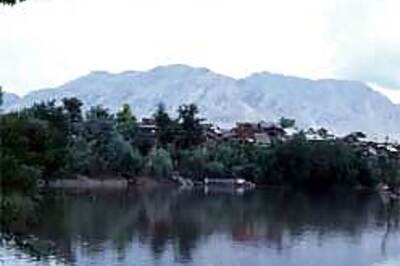
views
From weighted expectations on vaccine production to the uplifting performance at Tokyo Olympics, India spent much of 2021 under the global spotlight. It was in the thick of late-night drama at the UN climate summit, effecting a key change in the agreement draft. India also cautioned against Pakistan’s continued support to terrorist organisations and China’s expansionist moves at the UN General Assembly.
Here’s a look at India on the global stage in 2021:
Pharmacy of the World
Accounting for 60% of all vaccines sold across the globe, India was always going to be a major player in immunising much of the world against Covid-19. Despite being pushed to the breaking point after massive surge in infections in April, the country exported more than 65 million doses of Covid-19 vaccines to nearly 100 countries this year.
Being a key supplier for the world and for the UN-backed initiative aimed at vaccine equity known as COVAX, India had started exporting doses right from January but had to stop doing so to inoculate domestic populations during the brutal second wave that, at its peak, pushed infections to around 4,00,000 a day.
India resumed exports last month and the Pune-based Serum Institute of India (SII), world’s biggest vaccine manufacturer, has pledged to supply around 40 million doses of the AstraZeneca Covid-19 shot to COVAX by year-end. The government has also said it is ready to “expeditiously” approve more vaccine exports to Africa to help fight the new Omicron variant either through COVAX or bilaterally.
Besides helping to bridge the global vaccine inequality, the country has also made giant strides in vaccinating its own population, crossing the milestone of 1 billion doses administered on October 22.
Coming months after the second wave, India’s progress represents a significant step toward ending the crisis globally. After the virus killed tens of thousands of people, the government invested heavily in boosting vaccine production, stopped vaccine exports and tossed out cumbersome rules that had made it hard for state governments to get doses and for people to sign up for shots.
As the government centralised the procurement and distribution of vaccines, India’s inoculation program hit its stride, making use of the systems and know-how that had made vaccine campaigns against polio and other diseases such a success. The government also enlisted an army of volunteers, including paramilitary forces, teachers and religious leaders, to help get shots into arms.
In another major feat, India-made Covaxin received emergency use authorization from the World Health Organization (WHO) in November, paving the way for use in poorer countries due to its much easier storage requirements.
Tokyo Thrills
The United States, China and Japan may have taken the podium at the conclusion of the Tokyo Olympics, but the bright spot of the pandemic-hit even was definitely the Indian contingent.
Just healing from the devastating second wave of Covid-19, Indian athletes brought home the best-ever Olympic medal haul, managing to ignite a fresh sense of national pride among a still mourning nation.
In a cricket-crazy country, Neeraj Chopra’s Gold in javelin throw — the nation’s first in a track and field event since it gained independence from Britain – headlined the seven-medal finish, instantly catapulting the 23-year-old to stardom.
Apart from Chopra’s Gold, India won two Silver medals and four Bronze medals at the Tokyo Olympics. The Silver medals came from weightlifter Mirabai Chanu and wrestler Ravi Kumar Dahiya. The Bronze medals were won by shuttler PV Sindhu, the men’s hockey team, boxer Lovlina Borgohain and wrestler Bajrang Punia.
The women’s team came extremely close, losing to Britain in the bronze medal match, but earned praise and respect from millions across the country.
Climate Change
India was in the thick of late-night drama at the UN climate talks in Glasgow in November when it led China and other coal-dependent developing nations in rejecting a clause calling for the “phase out” of coal-fired power.
The two-week 26th United Nations Climate Change conference, more commonly referred to as COP26, delivered a major win in resolving the rules around carbon markets. The agreement for the first time targeted fossil fuels as the key driver of global warming and kept alive the hope of capping global warming at 1.5 degrees Celsius.
It, however, laid bare the sharp divide among developed and developing countries on the road to achieving that. Developing countries argued that rich nations, whose historical emissions are largely responsible for warming the planet, must finance their efforts both to transition away from fossil fuels and to adapt to increasingly severe climate impacts.
Rich nations once again resisted acknowledging financial liability for their years of emissions that drove climate change as they rose to economic prosperity.
In last-minute comprise after a huddle between the envoys from China, India, the United States and European Union, the contentious clause was hurriedly amended to ask countries to “phase down” their coal use instead of “phase out”.
India’s environment minister Bhupender Yadav said the revision reflected the “national circumstances of emerging economies.” “We are becoming the voice of the developing countries,” Reuters quoted him as saying.
“We made our effort to make a consensus that is reasonable for developing countries and reasonable for climate justice,” he said, alluding to the fact that rich nations historically have emitted the largest share of greenhouse gases.
At the summit in Scotland, Prime Minister Narendra Modi also announced “enhanced” targets for India to combat climate change – by 2030, India will increase its non-fossil fuel energy capacity to 500 giga watt, meet 50% of its energy requirements from renewable sources, reduce its total projected carbon emissions by one billion tonnes from now, and bring down the carbon intensity of its economy by less than 45%. And by 2070, India will achieve its target of net zero.
Message to Neighbours
In a 20-minute speech at the General Assembly in September, Prime Minister Narendra Modi warned the global community of challenges in India’s neighbourhood, without naming Pakistan and China.
In the speech delivered in-person and in Hindi, Modi called upon the international community to help the women, children and minorities of Afghanistan and said that it was imperative the country not be used as a base from which to spread terror.
“We also need to be alert and ensure that no country tries to take advantage of the delicate situation there, and use it as a tool for its own selfish interests,” he said in an apparent reference to Pakistan, wedged between Afghanistan and India.
Modi also highlighted what he called the need to protect oceans from “the race for expansion and exclusion.” Modi’s speech had come a day after he met one-on-one with US President Joe Biden and participated in a summit of “the Quad”: the US, Japan, India and Australia.
Read all the Latest India News here

















Comments
0 comment